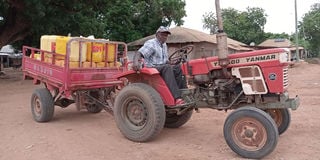Residents going without food as water shortage hits Lamu villages

A man carrying jerricans of water on a tractor to be supplied within Mokowe town in Lamu West where shortage of the crucial commodity continues to bite.
Residents of Bar’goni, Mokowe, Kwasasi, Ingini and Kiangwe in Lamu County are now being forced to go without food due to an acute water shortage which makes it hard for them to cook.
The Nation established that the residents are forced to walk for over 20 kilometres from Bar’goni village to Hindi town to buy water at hefty prices.
A 20-litre jerrican of water is being sold for between Sh50 and Sh100.
Diza Doza, an elder from the Boni minority community in Bar’goni village, said the problem became worse this month after the few boreholes and wells that they depended on dried up owing to the ongoing drought.
Mr Doza said many households in the area cannot even cook at times due to water shortage.
“Water shortage has become serious in our villages. Many times we’ve gone for several days without the commodity. Travelling from Bar’goni to Hindi is about 21 kilometres and we buy a 20-litre jerrican of water at Sh50 or more. We need help,” said Mr Doza.
Wake up very early
Amina Abuli said women and school going children suffer the most as they are forced to wake up very early in the morning and trek all the way from Bar’goni to Hindi daily in search of fresh water.
Ms Abuli expressed disappointment that school children in their villages sometimes miss classes in order to accompany their parents in search of water and food.
“Most of the days, our children here don’t go to school since they have no water to bathe or prepare food. Many of them always accompany us to far off places in search of water. The county and national governments should do something to ensure we get water,” said Mrs Abuli.
In Mokowe village, residents are forced to use salty water from boreholes and wells situated on the shores of the Indian Ocean for domestic use.
Turned salty
Omar Famau said the few wells and boreholes that they used to fetch fresh water from within Mokowe town have all turned salty due to the drought.
“We’re risking our lives by drinking dirty water. You can imagine using saline water from wells and boreholes for domestic consumption. We don’t have food or anything to support us. Let them distribute water in our villages through water boozers,” said Mr Famau.
Locals in the affected villages also pleaded with the county government to establish water desalination plants in the area.
Contacted, Lamu Water and Sewerage Company (Lawasco) Managing Director Kimani Wainaina told residents of some parts of Lamu to brace for serious water rationing and shortages as major wells in the county continue to dry up due to the ongoing drought.
Lamu usually depends on the Shella sand dunes and wells to supply water across the county.
However, since the drought season began early last month, several wells in Shella have reportedly dried up, resulting in a reduced water production and supply.
“The problem of water shortage in Lamu began since the onset of the dry season. As I speak, about three to four major wells at the Shella reservoir have already dried up with more expected to dry up if the drought persists. That means we should expect more water supply challenges if the drought persists. I therefore appeal to people to ration the water usage in their homes until normalcy resumes,” said Mr Wainaina.





